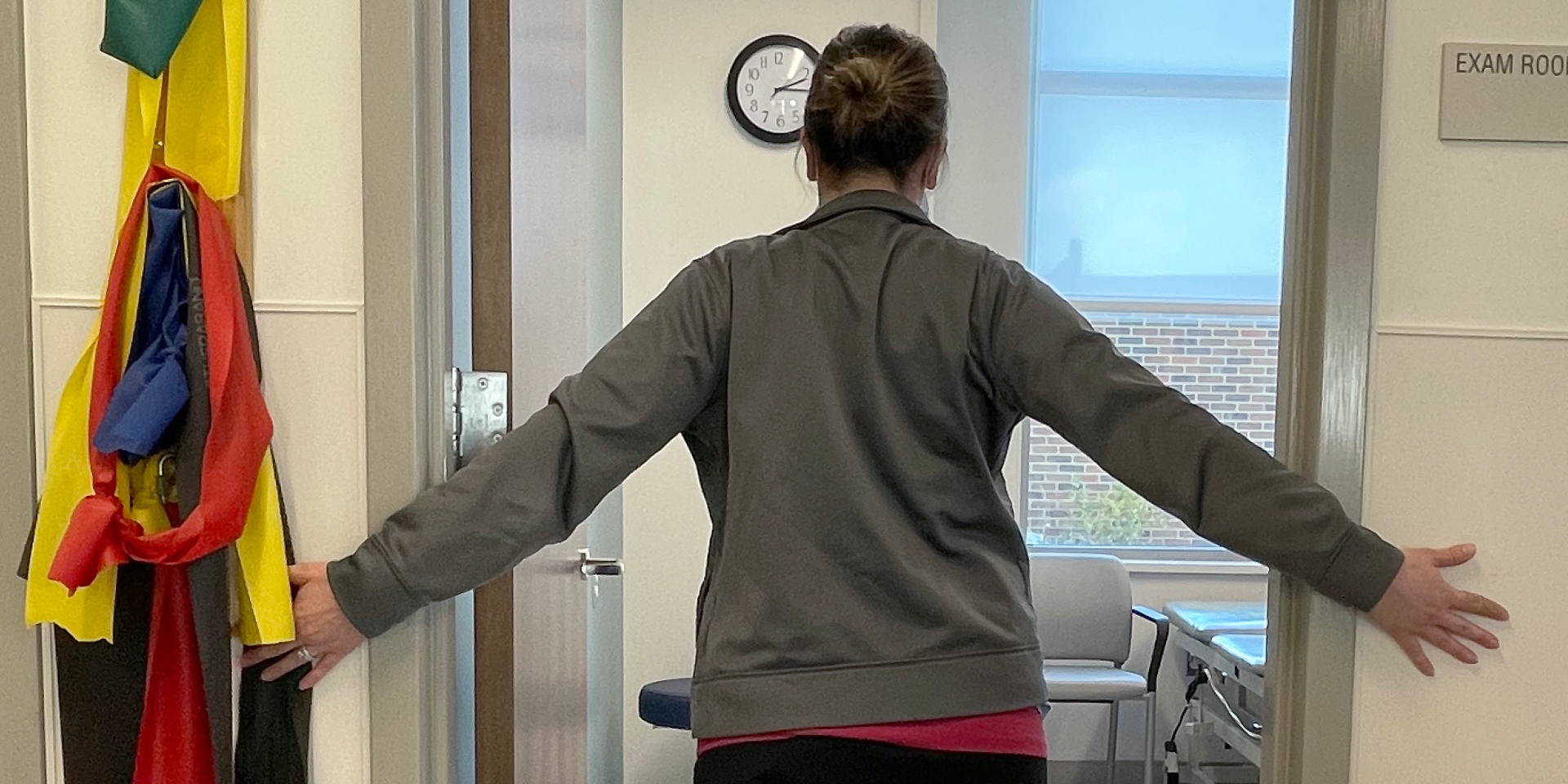The countdown to shorts season is on. To help you look and feel your best, Doylestown Health physical therapist Lauren Direso offers tips, encouragement and a simple, full-body home workout to help you get ready for summer.
A full-body workout, explains Lauren, combines cardiovascular exercise, strength training and stretching for a head-to-toe fitness boost to help you:
- Feel better mentally and physically
- Lose weight
- Tone up, reduce flab
- Build strength
- Increase stamina and endurance
- Improve flexibility
- Keep the body loose and mobile
- Alleviate aches and pains
Before you start
- Check with your physician to make sure you can safely exercise and increase your heart rate.
- Be mindful of any injuries you have.
- Maintain good posture with exercise, especially if you have low back pain.
- Find an appropriate space where you can move freely.
- Have water available and stay hydrated before, during and after exercise.
- Wear loose, comfortable clothing.
- Choose supportive sneakers with good arch support.
- Check resting heart rate* before you work out (instructions below).
- Check heart rate again after cardiovascular exercise.
Ease into Exercise
“Take it easy, congratulate yourself after each workout and don’t be upset if you don’t see improvement right away,” says Lauren. “Always begin with a warmup, and start with fewer repetitions of each exercise, then add reps over time. Listen to your body, and don’t push past the point where you are uncomfortable, in pain or extremely short of breath. Finish with a cool down, including more stretches and cardiovascular movement.”
Make Fitness a Habit
Lauren recommends picking a time that works well with your schedule. “Ideally, you would complete a full circuit (30-40 minutes) five times a week. Keep yourself accountable with reminders on your phone or a note on your bathroom mirror. Whether you choose an inspirational phrase or a note that says ‘Work Out,’ if you see the reminder and don’t exercise, then you are choosing not do it,” says Lauren. “Free activity tracker apps are also available to help set goals and track your progress.”
Time for Results
- From the very first workout, the body produces mood-elevating endorphins. Simply making a commitment to positive change is empowering.
- In 4–6 weeks, most people see a change in measurements and muscle tone.
- After 1–2 months of consistent workouts (4-5 times a week), you should start to see a difference.
Full-Body Home Workout
Cardio (1-2 minutes)
- Bike
- Quick-paced step-ups
- Lunge walking
- Jump rope
- Jumping jacks
Stretching (5 reps, 20 seconds each)
- Hamstring stretch using steps
- Calf stretch using steps
- Back extension stretch (prone press up)
- Doorway pec/arm stretches
- Crossbody shoulder stretch
Strengthening (pick 5-8 exercises, 2-3 sets, 10 reps each set)
- Wall push-ups
- Bicep curls with dumbbells or soup cans
- Arm raises with dumbbells or soup cans
- Resistance band arm rowing and extension
- Tricep dips in chair
- Squats
- Lunges
- Wall slides
- Wall Push-ups
- Leg lifts (All directions: back, side, stomach)
- Bridges
- Clamshells
- Planks/modified planks
Posture
- Neutral or straight spine
- Engage core
- Bend or squat with hip and knees bent, no rounding back
- Widen stance
- Upright posture
Know Your Heart Rate
Start by finding your resting heart rate. The American Heart Association recommends finding your pulse at the wrist, inside the elbow, side of neck or top of foot, and then counting the number of beats in 60 seconds.
Maximum Heart rate
The calculation for maximum heart rate is 220 minus your age. So, at age 50, the maximum heart rate is 220 – 50, or 170 beats per minute.
Target Heart Rate
Finding your target heart rate can help you gauge how hard you are working.
Moderate intensity: A target heart rate of 50-70% of your maximum heart rate is for improved performance, including changes in weight, flexibility, strength and endurance.
Vigorous activity: A target heart rate of 70-85% of your maximum heart rate is suggested for maximum performance.
About Doylestown Health
Doylestown Health is a comprehensive healthcare system of inpatient, outpatient, and wellness education services connected to meet the health needs of the local and regional community. The flagship of Doylestown Health is Doylestown Hospital, a not-for-profit, community teaching hospital with 245 beds and a medical staff of more than 600 providers who deliver the highest quality care in over 50 specialties. Renowned locally, regionally, and nationally, Doylestown Hospital provides superior healthcare and offers advanced surgical procedures, innovative medical treatments, and comprehensive specialty services. Serving Bucks County for over 100 years, Doylestown Hospital is proud to educate and train the next generation of physicians through its family medicine residency program. Ranked as one of the World’s Best Hospitals by Newsweek and 9th in Pennsylvania, Doylestown Hospital is distinguished in both infection prevention and patient experience. Doylestown Hospital is the only hospital in Pennsylvania to achieve 18 consecutive ‘A’ grades for patient safety from Leapfrog Hospital Safety Grade. Learn more at doylestownhealth.org.
